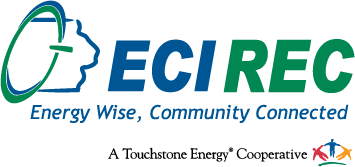Guidelines for Residential, Agricultural, and Small Commercial Service Extensions
A major addition to your farming operation or home that will require a separate meter also requires a consultation from the ECI REC service team to determine the size of your electric load and specify the equipment needed for your new facilities.
Call our Operations Department at 319-443-4343 or 877-850-4343 or complete the service extension form.
Who pays for the line extension?
After initial installation by the ECI REC, member-consumers are responsible for labor and material to backfill any trench or excavation due to settling.
Extensions of greater length require payment from the member-consumer. This extension payment will be required before construction begins.
Will I be able to recoup my cost for the line extension?
If a pre-payment for a line extension is required by the Cooperative, you will receive a monthly credit on your bill equal to $.02 per kilowatt-hour for 36 months, up to, but not exceeding, the maximum amount equal to the advanced payment. At the end of the 36 months, any balance remaining from the advanced payment is kept by the Cooperative.
What if another member-consumer wants to connect to the line extension I am paying for?
If another small business, home, or farm connects to the equipment paid in full or in part by a member-consumer within 5 years of the construction of service extension, the member-consumer that made the advance payment shall receive a prorated amount from the new member-consumer connecting into the existing equipment.
What if I need temporary service?
ECI REC will pay all or part of the cost of extending service to a new service only when the new load will be permanently located at the site. If the load may be temporary, the member-consumer will be required to make a non-refundable advanced payment equal to the estimated cost of installing the new equipment, the cost of removing the service, plus the cost of any non-salvageable materials.
What if I need a special service design?
If you request a more expensive line or service design (including route selection) than the Cooperative believes is required by good engineering practice, you must pay the difference between the higher cost design and the design proposed by the Cooperative.
